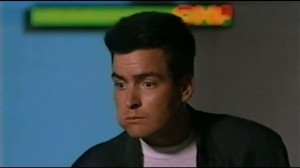Backtrack: Director’s Cut
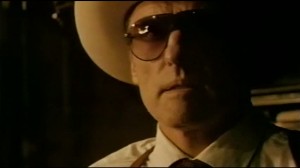 The imagery described by Hannibal Lecter (played by Anthony Hopkins) in Silence of the Lambs of Clarice Starling (played by Jodie Foster) where, as an orphaned young girl running away from the farm where she lives, carrying a baby lamb away from inevitable slaughter with her, is etched into society’s cultural mind as much as virtually anything else in film history. Clarice, trying to get all of the lambs to stop screaming, helplessly carrying one before being picked up by the sheriff and sent away from the farm to an orphanage is so evocative that you forget that we never see any of it. It’s so easy to imagine that many viewers swear they’ve seen it just like they think they saw Gwyneth Paltrow’s head in the box in Seven.
The imagery described by Hannibal Lecter (played by Anthony Hopkins) in Silence of the Lambs of Clarice Starling (played by Jodie Foster) where, as an orphaned young girl running away from the farm where she lives, carrying a baby lamb away from inevitable slaughter with her, is etched into society’s cultural mind as much as virtually anything else in film history. Clarice, trying to get all of the lambs to stop screaming, helplessly carrying one before being picked up by the sheriff and sent away from the farm to an orphanage is so evocative that you forget that we never see any of it. It’s so easy to imagine that many viewers swear they’ve seen it just like they think they saw Gwyneth Paltrow’s head in the box in Seven.
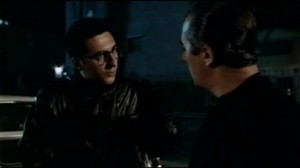 If Clarice running away from her fear is never actually seen, then why, in Backtrack, in the movie she shot right before Silence of the Lambs, is Jodie Foster seen running away from her captors, carrying a baby lamb? No one saw Backtrack; it had such a difficult post-production process (listen to my interview with the film’s screenwriter for more background) that the film was butchered and buried for two years by its soon-to-be-bankrupt distributor and disowned by its director and star Dennis Hopper. Was Foster aware of what she was doing, essentially making fun of her to-be Oscar winning role before she’d even participated in it?
If Clarice running away from her fear is never actually seen, then why, in Backtrack, in the movie she shot right before Silence of the Lambs, is Jodie Foster seen running away from her captors, carrying a baby lamb? No one saw Backtrack; it had such a difficult post-production process (listen to my interview with the film’s screenwriter for more background) that the film was butchered and buried for two years by its soon-to-be-bankrupt distributor and disowned by its director and star Dennis Hopper. Was Foster aware of what she was doing, essentially making fun of her to-be Oscar winning role before she’d even participated in it?
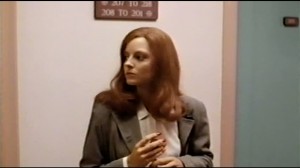 Such foresight would truly be astonishing, even more so than John Cusack appearing in both 2002’s Adaptation and 2003’s Identity. In that case, Adaptation has one “fictional” character (Donald Kaufman) write a screenplay that to the audience and his non-fiction brother (Charlie Kaufman, both are played by Nicolas Cage) sounds utterly clichéd and formulaic, which of course is the very reason it gets purchased. The screenplay Donald has written is suspiciously identical to that of Identity, except Identity isn’t played as a satirical joke, suggesting that the real Charlie Kaufman read the script for Identity, thought it was so ridiculous that he should make fun of it, and the same studio (Sony) didn’t notice, and made Identity anyway.
Such foresight would truly be astonishing, even more so than John Cusack appearing in both 2002’s Adaptation and 2003’s Identity. In that case, Adaptation has one “fictional” character (Donald Kaufman) write a screenplay that to the audience and his non-fiction brother (Charlie Kaufman, both are played by Nicolas Cage) sounds utterly clichéd and formulaic, which of course is the very reason it gets purchased. The screenplay Donald has written is suspiciously identical to that of Identity, except Identity isn’t played as a satirical joke, suggesting that the real Charlie Kaufman read the script for Identity, thought it was so ridiculous that he should make fun of it, and the same studio (Sony) didn’t notice, and made Identity anyway.
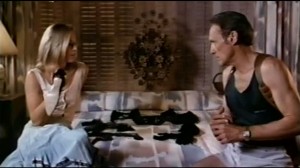 The lines aren’t nearly as clear in Backtrack; Hopper’s film is a tonal mess, and even in the longer director’s cut it’s quite clear that there are heaps of necessary transitional material missing. The fact that the exposition is handled over the opening credits, with Jodie Foster’s Anne Benton listening to a tape of herself being interviewed about her post-modern art implies that a lot of this was thrown together at the last minute, and this was simply the most efficient way to introduce anything. It’s not even clear that her art is meant to be taken seriously, it’s just heavy handed messages displayed on LED signs, until another fellow artist, played by Bob Dylan, describes her as a “literalist.” When hit man Milo (Hopper), assigned to take out Anne, who witnessed a mob murder, calls her on her pretensions, she gets defensive (and delivers the best line in the film, which I won’t ruin), we can’t help but feel that he’s right.
The lines aren’t nearly as clear in Backtrack; Hopper’s film is a tonal mess, and even in the longer director’s cut it’s quite clear that there are heaps of necessary transitional material missing. The fact that the exposition is handled over the opening credits, with Jodie Foster’s Anne Benton listening to a tape of herself being interviewed about her post-modern art implies that a lot of this was thrown together at the last minute, and this was simply the most efficient way to introduce anything. It’s not even clear that her art is meant to be taken seriously, it’s just heavy handed messages displayed on LED signs, until another fellow artist, played by Bob Dylan, describes her as a “literalist.” When hit man Milo (Hopper), assigned to take out Anne, who witnessed a mob murder, calls her on her pretensions, she gets defensive (and delivers the best line in the film, which I won’t ruin), we can’t help but feel that he’s right.
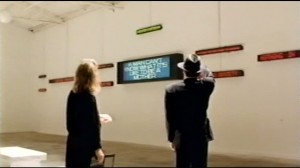 How aware Hopper was of the goofy nonsense he was creating is up in the air. Could the montages of mopey, introspective but dumb Milo playing the saxophone badly and learning about art possibly be serious? Some scenes, like one where Milo gets frustrated and tries to break the saxophone through a window, but is repeatedly betrayed by plexi-glass (surely one of the earliest examples of that now standard scene), are probably meant to be funny. As is the moment where Milo is struggling with what the best way to properly romance your kidnap victim is. But what about Milo trying to glean what Anne really means with her art, figuring out where she is, based on advertising slogans she’s written while in hiding? That’s where some of Hopper’s more esoteric touches get in his way. A scene where Milo aimlessly walks through a Native American ceremony, with a giant wooden figure being burned (very much shades of The Wicker Man and its stranger in a strange land themes), is just as hopelessly pretentious as any art Anne came up with. It makes it truly hard to believe that Hopper, with his Native American spiritual fixations, never worked with Oliver Stone. [Trust me, I had to check. It’s simply that hard to believe.]
How aware Hopper was of the goofy nonsense he was creating is up in the air. Could the montages of mopey, introspective but dumb Milo playing the saxophone badly and learning about art possibly be serious? Some scenes, like one where Milo gets frustrated and tries to break the saxophone through a window, but is repeatedly betrayed by plexi-glass (surely one of the earliest examples of that now standard scene), are probably meant to be funny. As is the moment where Milo is struggling with what the best way to properly romance your kidnap victim is. But what about Milo trying to glean what Anne really means with her art, figuring out where she is, based on advertising slogans she’s written while in hiding? That’s where some of Hopper’s more esoteric touches get in his way. A scene where Milo aimlessly walks through a Native American ceremony, with a giant wooden figure being burned (very much shades of The Wicker Man and its stranger in a strange land themes), is just as hopelessly pretentious as any art Anne came up with. It makes it truly hard to believe that Hopper, with his Native American spiritual fixations, never worked with Oliver Stone. [Trust me, I had to check. It’s simply that hard to believe.]
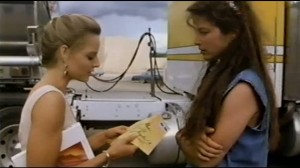 Certainly Hopper, like Stone, knew how to draw an impressive array of supporting actors, even if a lot of them probably felt like Milo’s edict about his work, “it’s a job, it don’t feel like much.” Dean Stockwell, in another of his long line of mob lawyers, probably had a lot more interesting quirks that hit the cutting room floor, Joe Pesci rants, raves, and curses like he knew he was about to get famous playing mobsters and/or loudmouth characters named Leo (as he did in 1989’s Lethal Weapon 2, shot a year after Backtrack), and John Turturro certainly hams it up as a slow-witted, existential gangster.
Certainly Hopper, like Stone, knew how to draw an impressive array of supporting actors, even if a lot of them probably felt like Milo’s edict about his work, “it’s a job, it don’t feel like much.” Dean Stockwell, in another of his long line of mob lawyers, probably had a lot more interesting quirks that hit the cutting room floor, Joe Pesci rants, raves, and curses like he knew he was about to get famous playing mobsters and/or loudmouth characters named Leo (as he did in 1989’s Lethal Weapon 2, shot a year after Backtrack), and John Turturro certainly hams it up as a slow-witted, existential gangster.
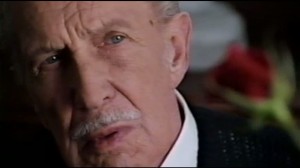 What lingers in the mind though, is the small role for Vincent Price, as the head of “the family,” who seems to be far too measured and classy to be either a head of this particular family or even in this movie. Price has a moment where he regretfully utters a word in Latin, “Absum,” which means absent, and though we never get a full explanation, it is like Price himself uttering his regret at his many roles camping it up, limiting himself in so many schlocky horror roles. Or maybe it’s also Price’s character looking back on a wasteful term as boss of this particular inept bunch of mafiosos.
What lingers in the mind though, is the small role for Vincent Price, as the head of “the family,” who seems to be far too measured and classy to be either a head of this particular family or even in this movie. Price has a moment where he regretfully utters a word in Latin, “Absum,” which means absent, and though we never get a full explanation, it is like Price himself uttering his regret at his many roles camping it up, limiting himself in so many schlocky horror roles. Or maybe it’s also Price’s character looking back on a wasteful term as boss of this particular inept bunch of mafiosos.
 It’s not that Backtrack is a waste as a whole though. Foster, whose role could have been reduced to the “pretty-girl-in-peril” type (especially as the movie is so similar in story to Nurse Betty), delivers a wide-eyed performance similar to the one she had in Taxi Driver. While she’s more aware of the danger she’s in, Foster’s scenes where she is utterly surprised by Milo’s lack of knowledge of the world are so inviting without being condescending, eerily reminiscent of how she responded to De Niro in Taxi Driver. Hopper didn’t have nearly as much control as De Niro did though, and so some of his directorial choices play better in retrospect, like the film’s musical score that sounds like slowed-down circus music. But he also clearly learned from those he worked with, gleaning the notion of perpetual industrial noises invading Backtrack’s soundtrack from David Lynch, who directed Hopper in Blue Velvet. Hopper also borrowed Lynch’s absolute confidence in his material, not worrying about leaving the audience behind. It’s a shame the studio was afraid that might be the case.
It’s not that Backtrack is a waste as a whole though. Foster, whose role could have been reduced to the “pretty-girl-in-peril” type (especially as the movie is so similar in story to Nurse Betty), delivers a wide-eyed performance similar to the one she had in Taxi Driver. While she’s more aware of the danger she’s in, Foster’s scenes where she is utterly surprised by Milo’s lack of knowledge of the world are so inviting without being condescending, eerily reminiscent of how she responded to De Niro in Taxi Driver. Hopper didn’t have nearly as much control as De Niro did though, and so some of his directorial choices play better in retrospect, like the film’s musical score that sounds like slowed-down circus music. But he also clearly learned from those he worked with, gleaning the notion of perpetual industrial noises invading Backtrack’s soundtrack from David Lynch, who directed Hopper in Blue Velvet. Hopper also borrowed Lynch’s absolute confidence in his material, not worrying about leaving the audience behind. It’s a shame the studio was afraid that might be the case.



